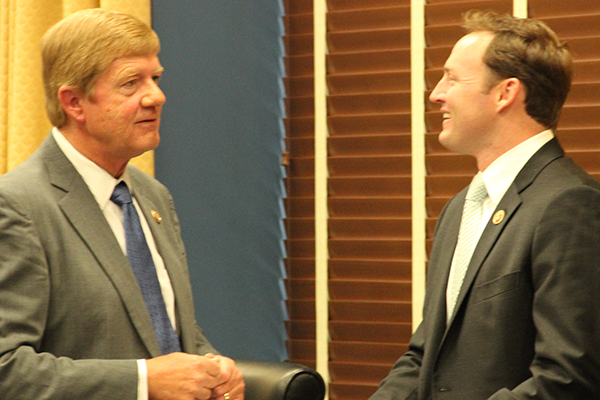
House Small business subcommittee on Agriculture, Energy and Trade Commissioner Scott Tipton, R-Colo., talks with Ranking member Patrick Murphy, D-Fla.
The controversial Keystone XL pipeline, whose approval has been delayed by the Obama administration, would not create the extensive environmental damage that some fear, a Massachusetts Institute of Technology energy economics professor told a House small business subcommittee Thursday.
The pipeline, proposed by Canadian company TransCanada would transport crude oil from the oil sands in Alberta, Canada, to the Gulf of Mexico. The State Department needs to approve a permit to allow construction in the U.S.
Environmentalists are worried over the amount of greenhouse gas emissions from the extraction of oil sands.
“Tar sands are certainly more energy intensive than the average oil refined in the U.S.—requiring more energy at the extraction phase,” said Christopher Knittel, professor of energy economics at MIT. “Climate change is one of the most important issues our country has to address.
“While some have called the Keystone XL pipeline ‘game over’ for the climate, I believe it is simply not true.”
Knittel said Keystone opponents are suing the wrong measurement by comparing tar sands with average oil refined in the U.S. “The question is what oil will replace the tar sands,” he said, “and it is not the average oil that is sold in the U.S. It’s very likely to be Venezuelan oil, which is dirtier than tar sand.”
The pipeline is estimated to create more than 40,000 jobs, according to Rep. Scott Tipton, the Colorado Republican who is chairman of the House Small Business subcommittee on agriculture, energy and trade. Many of the jobs are associated with small businesses.
“The Keystone pipeline can help us reach our goals. It is good for job creation, good for energy security, and good for small business,” said Tipton in his opening remarks. “We have a rare opportunity to create thousands of jobs immediately, many through small businesses, and do so in a responsible way.”
The top Democrat on the committee, Florida Rep. Patrick Murphy, agreed that the pipeline will create many jobs, but said it’s important to address the environmental factors associated with the pipeline.
Mat Brainerd, a small businessman from Tulsa, Okla., said small businesses need cheaper energy.
“If we have a reduction in cost for diesel, that will be passed on to our customers, and the reason for that is we have a very competitive marketplace for selling commodities,” said Brainerd, president of Brainerd Chemical Company. “As the end user gets a better price, you are going to see better economic growth.
